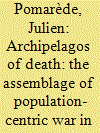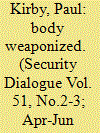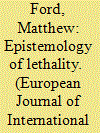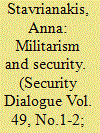|
|
|
Sort Order |
|
|
|
Items / Page
|
|
|
|
|
|
|
| Srl | Item |
| 1 |
ID:
173159


|
|
|
|
|
| Publication |
Delhi.
|
| Summary/Abstract |
How is the notion of success rearticulated in the contemporary context of endless counterinsurgencies (COIN)? To answer, the paper engages the thesis that the recent COIN campaigns were founded on a dysfunctional disconnect between the “hearts and minds” principles and the reality of the indefinite use of force. I show that this tension (called the “tactical trap”) is not a pathology of COIN, but one of its productive sites. The tactical trap is an assemblage of violence that brings together the endless use of force and the population-centric narrative through the principle of futurity, i.e. an indeterminate horizon of “progress.” Taking inspiration from the Critical War Studies and the Afghan warfare as a case study, I highlight the paradoxical nature of population-centric war: it is founded on a violence that makes COIN both a permanent state of failure and a probable success. The indeterminacy of violence is then analyzed as a new ordering of risk-management warfare, based on the everyday (re)invention of the potentiality of “progress.”
|
|
|
|
|
|
|
|
|
|
|
|
|
|
|
|
| 2 |
ID:
175123


|
|
|
|
|
| Summary/Abstract |
It is today common to argue that rape is a weapon, tool or instrument of warfare. One implication is that armed groups marshal body parts for tactical and strategic ends. In this article, I interrogate this discourse of embodied mobilization to explore how body weaponry has been made intelligible as a medium for sexual violence. First, I show that, despite wide rejection of essentialist models, the penis and penis substitutes continue to occupy a constitutive role in discussions of sexual violence in both political and academic fora, where they are often said to be like weapons, a tendency I term ‘weapon talk’. Second, I trace the image of the body weapon in key threads of feminist theorizing and commentary, to show how the penis has appeared as a ‘basic weapon of force’ in various permutations. Third, I explore the weaponization of the body as it appears in military thought and in the cultural circulation of ideas about the soldiering body in which sexual pleasure and violence are frequently conflated. Building on this foundation, I propose that these literatures collectively describe an uncanny weapon object, and I draw out the significance of this term for feminist security studies and martial empiricism. In short, the uncanny haunts accounts of sexual violence in the collision of sexuality and machinery in the image of a body weapon, in the unsettling designation of sexuality as itself both familiar and dangerous, and in the strange movement of violent bodies across the boundary between wartime and peacetime. A concluding discussion draws out implications and challenges for thinking about embodied violence, advocating renewed attention to the history of weaponization as a fallible and confounding process.
|
|
|
|
|
|
|
|
|
|
|
|
|
|
|
|
| 3 |
ID:
171788


|
|
|
|
|
| Summary/Abstract |
The science of ammunition lethality is a field that seeks to define the point at which military ordnance takes life and produces death. By historicising lethality's epistemology, I reveal the intellectual fissures and scientific uncertainties that have been reified and embedded into contemporary conceptions of military power. This not only tells us something about the processes by which science is subordinated to war, but also offers a new lens from which to consider the way knowledge claims about battle are co-constructed and legitimated through military practices. As a result, this article places science back into a narrative that otherwise frames the ontology of war in terms of fighting.
|
|
|
|
|
|
|
|
|
|
|
|
|
|
|
|
| 4 |
ID:
157917


|
|
|
|
|
| Summary/Abstract |
While attention to security has grown exponentially over the last few decades, militarism – the preparation for and normalization and legitimation of war – has not received the widespread and sustained focus it warrants in mainstream or critical circles. Rather than stake a claim for one concept over the other, however, this article – and the special issue to which it serves as an introduction – asks how we are to understand the relationship between security and militarism, both as analytical tools and as objects of analysis. We examine, first, what analytical and political work militarism and security do as concepts, and how they can be mobilized methodologically; second, what the possibilities are of fruitful exchange between knowledges produced about these concepts or practices; and, third, what the limits are of militarism and security. In the process, we address the shifts in the world that international relations and its related subfields study; shifts in the institutional framing and materiality of fields and subfields of research; and shifts in how international relations studies the world. Read together, the contributions to the special issue make the case for a reinvigorated focus on the mutual co-constitution of militarism and security.
|
|
|
|
|
|
|
|
|
|
|
|
|
|
|
|
| 5 |
ID:
152103


|
|
|
|
|
| Summary/Abstract |
Recent breakthroughs in neuroscience have led to increasing concern about its uses in warfare. This article challenges the primacy of dual-use frameworks for posing ethical questions concerning the role of neuroscience in national security. It brings together three fields – critical war studies, bio-ethics, and the history of medicine – to argue that such frameworks too starkly divide ‘good’ and ‘bad’ military uses of neurotechnology, thus focusing on the degradation of human capacities without sufficiently accounting for human enhancement and soldier rehabilitation. It illustrates this through the emergence of diagnoses of Traumatic Brain Injury and Polytrauma in the context of post-9/11 counterinsurgency wars. The article proposes an alternative approach, highlighting the historical co-production and homology of modern war and medicine so as to grapple with how war shapes neuroscience, but also how neuroscience shapes war. The article suggests new routes for thinking through the connections between war, society, science, and technology, proposing that we cease analysis that assumes any fundamental separation between military and civilian life.
|
|
|
|
|
|
|
|
|
|
|
|
|
|
|
|
| 6 |
ID:
106193


|
|
|
|
|
| Publication |
2011.
|
| Summary/Abstract |
This paper approaches the ontology of war by asking why, despite its constitutive function for politics and society, has war never been made the object of an academic discipline? Through an analysis of the relationship between war and knowledge about war, we argue that the ontology of war is such that it disrupts foundational claims of the kind necessary for conventional forms of academic disciplinarity. At the center of the ontology of war is fighting, an idea we recover from Clausewitz. A moment of radical contingency, fighting both compromises knowledge about war and forces the unmaking and remaking of social and political orders. These generative powers of war operate through the production of systems of knowledge and their institutionalization in the academy, the state and wider society. Although of existential significance for political authority, these knowledges are vulnerable to the very contingency of war that produces them. This complex of relations between war, knowledge, and power we term War/Truth. As such, an analytical framework adequate to war requires a reflexive relation to truth claims. We clear the ground for such a "critical war studies."
|
|
|
|
|
|
|
|
|
|
|
|
|
|
|
|
| 7 |
ID:
141195


|
|
|
|
|
| Summary/Abstract |
Against a surprising level of agreement between Clausewitz, contemporary military doctrines and critical war studies on an ontology of war as fighting, we suggest that the study of contemporary warfare needs to focus more on war as processing. Through Jean Baudrillard we argue that at least some of what is referred to as ‘war’ is no longer characterised by encounters through fighting. We exemplify our argument by how the repetitive battle-rhythm of military targeting strives for perfect war. What remains is not war as an object in itself, but a reified ‘war’ that obscures the disappearance of that very object. The debate on war contributes to the reification of such a war, as an imperative telling us: ‘we have a concept, you must learn to think through it’.
|
|
|
|
|
|
|
|
|
|
|
|
|
|
|
|
|
|
|
|
|